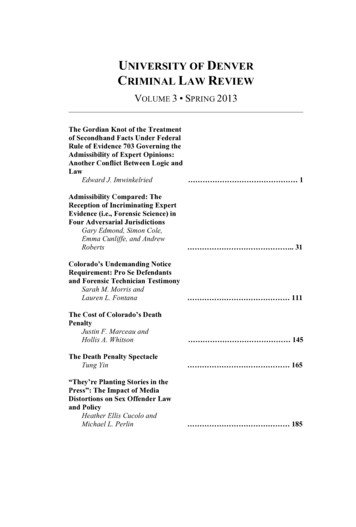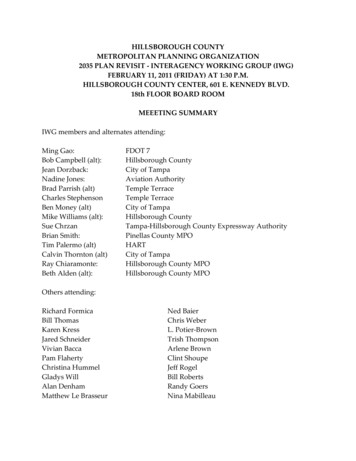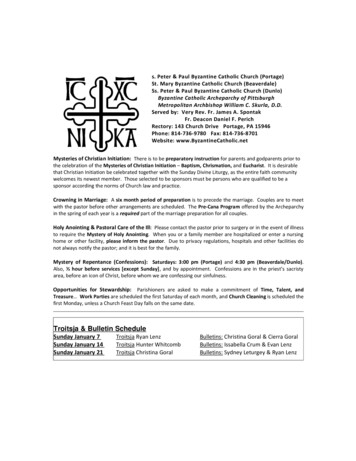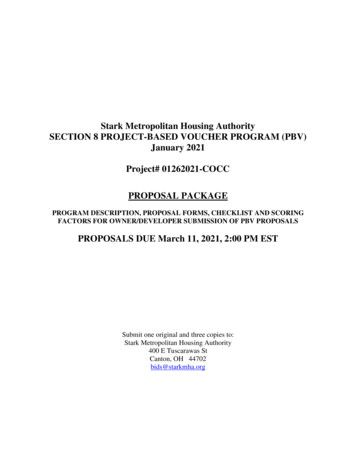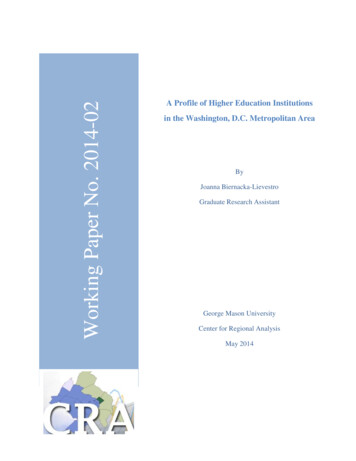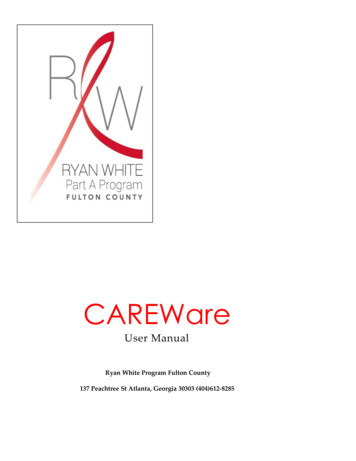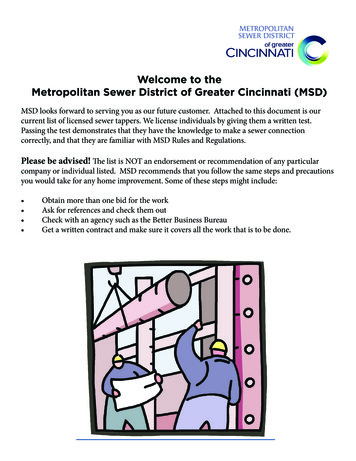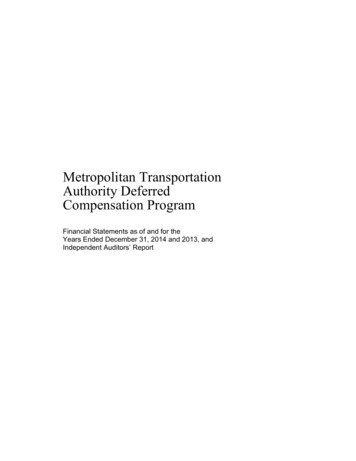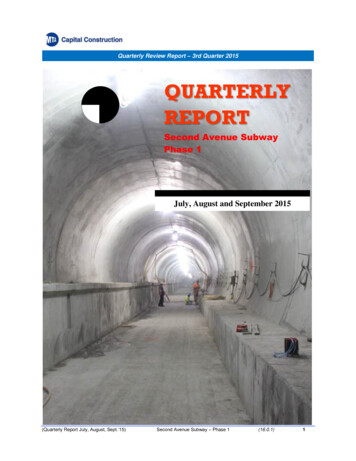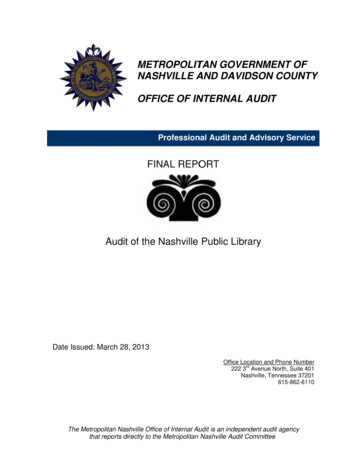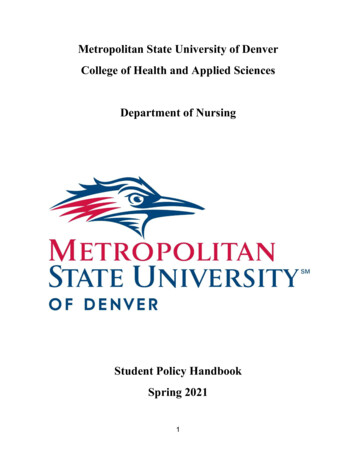
Transcription
Metropolitan State University of DenverCollege of Health and Applied SciencesDepartment of NursingStudent Policy HandbookSpring 20211
Changes to the student handbook can be made at any time. The department will makean effort to minimize changes. However, when changes are made, students will benotified through their MSU Denver student e-mail.TABLE OF CONTENTSPageWELCOME. 6HISTORYThe University . 7The Department of Nursing. 7National Accreditation. 7NURSING MAJOR STUDENT HANDBOOKPurpose . 8Content. 8SECTION I – Nursing ProgramMission . 9Philosophy . 9Simulation Center Mission and Vision . . 11Curriculum Framework . 11Student Learning Outcomes . 14Curriculum . 16SECTION II – University PoliciesElectronic Communication Policy . 16MSU Denver Best Grade Stands Policy . 16Observation of Legal Holidays . 17Student Code of Conduct .17Discrimination and Sexual Harassment 17Prohibition on Sexual Misconduct .18Equal Opportunity Act . .18ADA Accommodations for Students with Disabilities . .18Family Educational Rights and Privacy Act (FERPA) . 19Fresh Start Policy . 19Withdrawal/Incomplete MSU Denver Policies 19Academic Dishonesty . 21Plagiarism - MSU Denver Academic Integrity Official Statement . 21Grade Appeal . .22Inclement Weather Closures . .222
SECTION III – Nursing Department PoliciesNursing Major Course Syllabi. 23Clinical Practice . 23General Information . 24Criminal Background Checks and Drug Screening Requirements . 24Minimum Functional Abilities for Admission, Progressionand Completion of the Nursing Program . 25Observation . 25Communication . 25Motor . 25Intellectual, Conceptual, Integrative, and Quantitative Abilities . 26Behavioral and Social Attributes . 26Grading Policies . 26Methods of Evaluation .26Department Grading Scale 26Rounding Policy . 27Academic Jeopardy . .27Late Exam/Assessment/Quiz Policy .27Collaborative Testing Policy . 28Late Assignment Policy 28HESI Electronic Portfolio Guided NCLEX Preparation Plan .28Required Non-Graded Assignments 28Methods of Instruction . .29Methods of Learning . . 29Written Work Requirements . . .29Attendance Requirements .29Academic Advising .What You Can Expect from Your Academic Advisor .Progression Policies.Performance Improvement Plan .Readmission to the Department of Nursing Program after Withdrawal .Eligibility for Readmission (ANO and TNO) .Procedure for Readmission (ANO and TNO).Eligibility for Program Continuation/Readmission (BRNCO).“Stopping Out” for a Semester (BRNCO) .Complaint Policy Procedure.Professional Behaviors .Unprofessional Behaviors .Drug/Alcohol Policy.Student Employment .Transportation .3303030313333343536363738393939
SECTION IV – Classroom PoliciesClassroom Expectations . 40Written Assignments . 41Recording Devices. 41Use of Computers in the Classroom. 42SECTION V – Laboratory Policies for On-Campus LabsOn-Campus Lab Expectations. 42On-Campus Lab Responsibilities . 42Simulation Lab Policies. 43SECTION VI – Clinical PoliciesClinical Expectations .Pre-Clinical Placement Requirements.Clinical Attendance .Clinical Absence Policy .Inclement Weather Closure .Clinical Preparation .Clinical Responsibilities .HIPAA Regulations .List of Procedures Students Cannot Perform in the Clinical Setting .Professional Appearance .Safe Practice Responsibilities .Unsafe Practice .Workers’ Compensation Procedures for Work Related Injury or Illness .Employee Notification of Worker’s Compensation Procedures .4646474849494950505152525354SECTION VII – Nursing Student InvolvementOpportunities for Student Involvement .MSU Denver Student Nurses’ Club .MSU Denver Pinning Ceremony .Sigma Theta Tau International Honor Society of Nursing .54545455SECTION VIII – Student Services Provided by MSU Denver and the Nursing DepartmentAbout Your Student File . 55Release of Information Requirements . 55SECTION IX – General Information about the Practice of Professional NursingAbout the Practice of Professional Nursing . 56NCLEX Examinations/RN Licensure . 56ANA – American Nurses Association . 56SECTION X – Student Acknowledgement . 57APPENDICES4
A – Nursing Major Courses for Baccalaureate Registered Nurse Completion Option . 58B – Nursing Major Courses for Accelerated Nursing Option . 59C – Nursing Major Courses for Traditional Nursing Option . 60D – Department of Nursing Committees . 61E- COVID-19 Reporting Policy . .62F – Waiver of Liability for Students in Clinicals, Field Placements, or Internships .635
WELCOMEThe Administration, Faculty and Staff welcome you to the Department of Nursing andcongratulate you on your acceptance into the Accelerated Nursing Option (ANO), TraditionalNursing Option (TNO) or the Baccalaureate Registered Nurse Completion Option (BRNCO).The Administration, Faculty and Staff are here to help you reach your educational andprofessional goals and offer our support throughout this step on your journey.The Department of Nursing offers three program options:The Accelerated Nursing Option offers baccalaureate nursing education for students with aprior non-nursing baccalaureate degree. The option includes the same number of credithours, classroom hours and clinical hours as traditional baccalaureate nursing programswithin an accelerated calendar. Courses may be taught in the classroom, on-line or hybridformat and include skills laboratory and clinical hours.The Baccalaureate Registered Nurse Completion Option offers baccalaureate nursingeducation for students who are Registered Nurses with an associate degree in nursing or anursing diploma. Courses are taught predominately in an on-line format with a project basedclinical component in Community Health Nursing. Several options are available to completethe clinical component in Nursing Senior Experience.The Traditional Nursing Option offers baccalaureate nursing education for students. Theoption includes nursing courses taught over four academic semesters. Courses may be taughtin the classroom, on-line or hybrid format and include skills laboratory and clinical hours.This Student Policy Handbook presents the policies, procedures and general informationintended to assist you as you progress through the nursing program. As a student in any ofthese options, you are responsible for all information in the Metropolitan State University ofDenver’s (MSU Denver) Catalog, the MSU Denver Student Handbook, this Department ofNursing Student Policy Handbook and all Department of Nursing Course Syllabi in printed oron-line versions. Failure to read and understand the policies and procedures contained inthese documents and other appropriate documents and/or failure to contact an AcademicAdvisor does not relieve the student of this responsibility.6
HISTORYThe UniversityMetropolitan State College, established by the Colorado State Legislature in 1965 as abaccalaureate degree granting institution, was renamed Metropolitan State College of Denver(Metro State) in 1990. As of June 7, 2002, Metropolitan State College of Denver has beengoverned by the Metropolitan State College of Denver Board of Trustees appointed by theGovernor of Colorado. Authorized by Colorado’s legislature, Metropolitan State College ofDenver was renamed Metropolitan State University of Denver (MSU Denver) on July 1,2012.The Department of NursingIn 1967 the nursing program began as an associate degree program within the Department ofNursing and Allied Health. The Department implemented a baccalaureate registered nursecompletion option (BRNCO) in 1973, transferring the associate degree program toCommunity College of Denver in 1974. The BRNCO provides baccalaureate nursingeducation to Registered Nurses (RNs) with an associate’s degree or a diploma in nursingunder the Colorado Nursing Articulation Model.In 2004, the Department of Nursing implemented the Accelerated Nursing Option (ANO).The ANO provides baccalaureate nursing education to students with a previous non-nursingbaccalaureate degree.The Department of Nursing implemented a Traditional Nursing Option (TNO) in spring 2014to offer baccalaureate nursing education for students.Nursing education at MSU Denver has been offered within the Department of Nursing andAllied Health, the Department of Nursing and Health Care Management, and the Departmentof Health Professions. Since July 1, 2002, the Department of Nursing has been a departmentseparate from the other health profession programs at MSU Denver.National AccreditationThe Baccalaureate Registered Nurse Completion Option (BRNCO) received initialaccreditation from the National League for Nursing in 1976. On-going national accreditationhas remained in place through the National League for Nursing Accrediting Commission(NLNAC) recognized as a national accrediting agency by the U.S. Department of Education.NLNAC granted accreditation to the Accelerated Nursing Program (ANO) at its inception in2004.The MSU Denver Nursing Program is accredited by the Accreditation Commission forEducation in Nursing (ACEN), formerly the National League of Nursing AccreditingCommission (NLNAC). In July 2013, the Board of Commissioners granted continuingaccreditation to the MSU Denver baccalaureate nursing program for eight years. The nextscheduled evaluation visit will be in spring 2021. The ACEN may be contacted at 3343Peachtree Road NE, Suite 850, Atlanta, Georgia 30326; by telephone at 404-975-5000; or viathe Internet at www.acenursing.org.7
NURSING MAJOR STUDENT HANDBOOKPurposeThe purpose of this handbook is to provide information for the student about the guidelines,policies and procedures of the Nursing Program at Metropolitan State University of Denver. Itis imperative that you read and understand the content of this handbook. You are also requiredto sign and date the acknowledgement of receipt form on the last page of the handbook.Please make an appointment with your academic advisor for further interpretation of thecontent and/or to clarify concerns or questions.ContentThe handbook is divided into ten sections plus appendices:1. Nursing Department Mission, Philosophy, Student Learning Outcomes andCurriculum Framework.2. University Policies3. Nursing Department Policies4. Classroom Policies5. Laboratory Policies6. Clinical Policies7. Policies for student interaction and influence in the governance system of theDepartment of Nursing.8. Student services provided by the Metropolitan State University of Denver and theDepartment of Nursing.9. General information about the practice of professional nursing.10. Student Acknowledgement8
SECTION INURSING PROGRAM MISSION, PHILOSOPHY, LEARNINGOUTCOMES and CURRICULUM DESIGNMetropolitan State University of DenverDepartment of NursingMISSIONThe mission of the Department of Nursing is to provide a high quality, accessible, enrichingeducation to students pursuing a baccalaureate degree in nursing. Our learning communitycultivates graduates who are prepared with the knowledge, skills and competencies to advanceprofessional nursing practice in a diverse, global and technological society. The Departmentof Nursing is committed to academic excellence, collaborative community involvement andpromotion of scholarly achievement. The mission of the Department of Nursing is congruentwith the missions of Metropolitan State University of Denver and the College of ProfessionalStudies.PHILOSOPHY OF NURSING EDUCATIONThe nursing faculty believe that nursing education is a dynamic, intellectual process thatprepares students for professional nursing practice in a changing healthcare delivery system.Baccalaureate nursing education incorporates knowledge from the natural sciences, socialsciences and nursing. The goal of the nursing program is to prepare a generalist professionalnurse to practice in current and future healthcare delivery systems.The nursing faculty believe in promoting educational mobility by offering the followingnursing educational options: the Baccalaureate Registered Nurse Completion Option(BRNCO), the Accelerated Nursing Option (ANO), and the Traditional Nursing Option(TNO). The Essentials of Baccalaureate Education for Professional Nursing Practicepublished by The American Association of Colleges Nursing, and the Quality and SafetyEducation for Nurses (QSEN) competencies, and the American Nurses Association’s Code ofEthics for Nurses are used as foundational documents for curriculum development.The nursing faculty plan and implement a nursing education program using the four conceptsof the nursing paradigm (Patient, Nursing, Health and Environment). The followingstatements describe the beliefs of the nursing faculty about these concepts:Patient - Individuals, families, groups, communities or populations who are the recipients ofnursing care. Patients are diverse and complex with unique characteristics and health needs.9
Patients may function in independent, interdependent or dependent roles and may seek orreceive nursing care related to disease prevention, health promotion, or health maintenance aswell as illness and end of life care (AACN, 2008).Nursing - An interactive process in
The Accelerated Nursing Option offers baccalaureate nursing education for students with a prior non-nursing baccalaureate degree. . Nursing education at MSU Denver has been offered within the Department of Nursing and Allied Health, the Department of N
